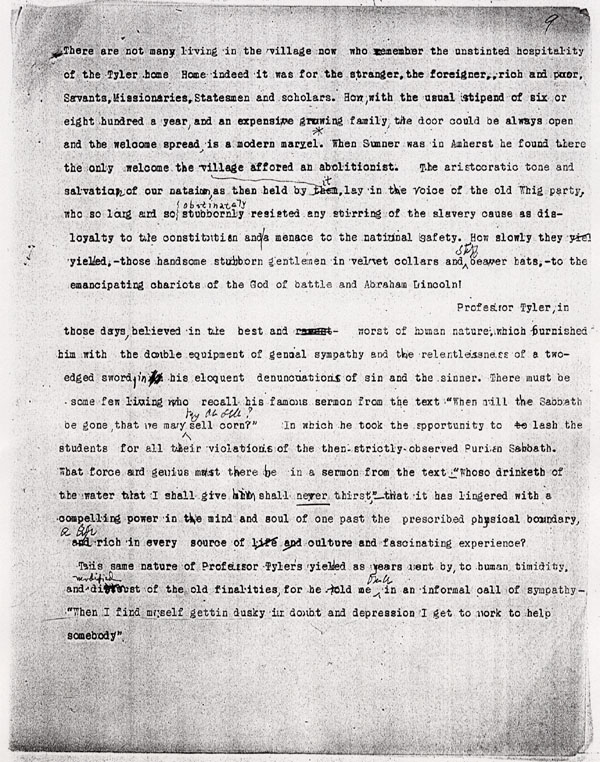
-------------------------------------------------------------------------------------------------------------------------------------
There are not many living in the village now who remember the unstinted hospitality
of the Tyler home Home indeed it was for the stranger, the foreigner,, rich and poor,
Savants, Missionaries, Statemen and scholars. How, with the usual stipend of six or
eight hundred a year, and an expensive growing fmaily, the door could be always open
and the welcome spread, is a modern marvel.* When Sumner was in Amherst he found there
the only welcome the village affored [sic] an abolitionist. The aristocratic tone and
salvation of our nataion [sic], as then held by them it, lay in the voice of the old Whig party,
who so long and so | obstinately stubbornly resisted any stirring of the slavery cause as dis-
loyalty to the constitution and a menace to the national safety. How slowly they yiel
yielded, -- those handsome stubborn gentlemen in velvet collars and stiff beaver hats, -- to the
emancipating chariots of the God of battle and Abraham Lincoln!
Professor Tyler, in
those days, believed in the best and rarest worst of human nature, which furnished
him with the double equipment of genial sympathy and the relentlessness of a two-
edged sword, in ? his eloquent denunciations of sin and the sinner. There must be
some few living who recall his famous sermon from the text "When will the Sabbath
be gone, that we may buy or sell sell corn?" In which he took the opportunity to to lash the
students for all their violations of the then-strictly-observed Puritan Sabbath.
What force and genius must there be in a sermon from the text -- "Whoso drinketh of
the water that I shall give him shall never thirst," -- that it has lingered with a
compelling power in the mind and soul of one past the prescribed physical boundary,
and a life rich in every source of life and culture and fascinating experience?
This same nature of Professor Tyler's yielded as years went by, to human timidity,
and modified distrust of the old finalities, for he told me once in an informal call of sympathy --
"When I find myself gettin [sic] dusky in doubt and depression I get to work to help
somebody".



